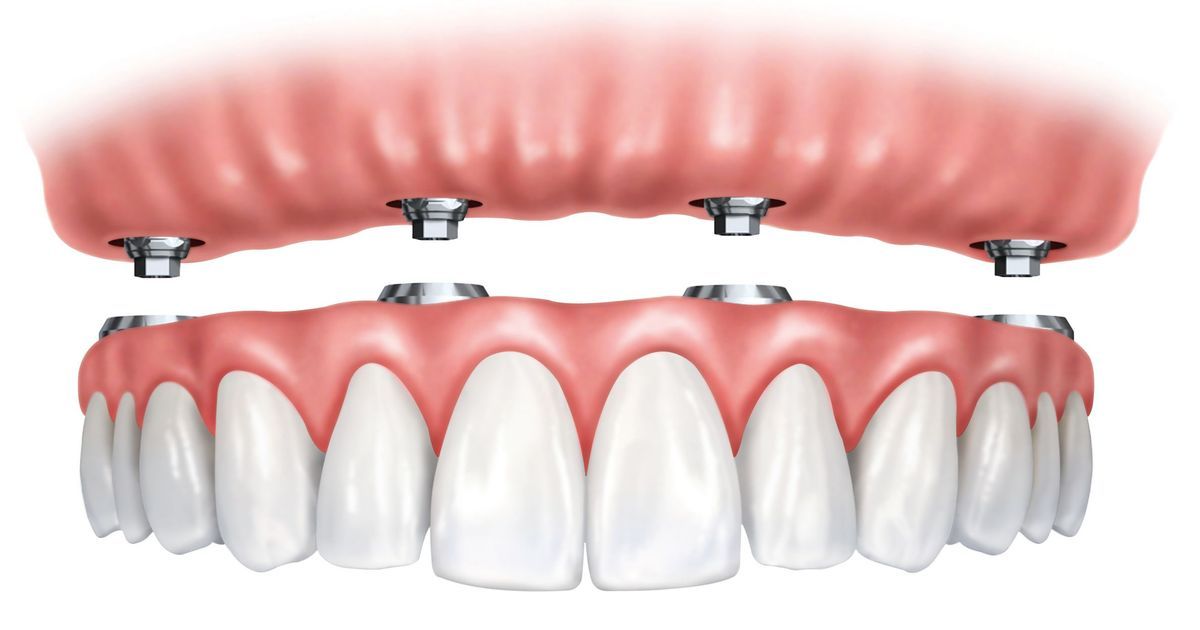Dental technology continues to advance. This brings more and better options for people who lose their teeth. Two of these options are fixed dentures and Snap-On dentures. You need to understand the difference between these two for you to choose right.
What are Snap-On Dentures?
Snap-on dentures are like traditional removable dentures that snap into place. However, unlike the traditional dentures, these dentures have between two and four locators on the plate’s underside that attach to the implant abutment. The dentures do not rock, shift, or rub as the implants ensure they are secure in place.
You need to remove the dentures and clean them and maintain them just as you would with a traditional denture. Soak the denture in an antiseptic solution overnight and clean them with a brush in the morning. Wash your mouth and wipe it with a dry cloth before you snap the dentures back.
Dentures are ideal when someone needs a more stable denture, but they are not eligible for fixed denture treatment. One can have a new denture, or the current denture can be designed to snap into place.
What is a Fixed Denture?
A fixed denture is permanently set so that you never have to remove it every day. The dentist can use four or more implants to support the dentures. The dental implants act as the root to your teeth and are made from titanium to hold the dentures in place. These implants go into your jawbone, and they stay in place permanently.
Only a dentist can remove the fixed dentures for repairs or replacement, and they need specialized tools to do that. If you want a more permanent solution, and you are tired of removing your dentures every day, you can go for the fixed dentures.
Which Is Durable?
Dental implants ensure that the bone in your mouth does not shrink with time. If the bones shrink because of a process known as resorption, your oral anatomy will change, and this also will affect the way your denture fits. The implants make the jaw stronger, and this is why fixed dentures are longer lasting.
The snap-on dentures are not as strong as fixed dentures or natural teeth. You will still need to eat softer food, which is in small pieces. With fixed or permanent dentures, you chew the same way you would with natural teeth. Implants make the dentures feel like natural teeth and will never move around when you are eating. However, the snap on teeth is more affordable.
Which is more comfortable?
Both snap-on and fixed dentures do not rub or create sore spots. They do not shift around in your mouth in a manner that makes them uncomfortable. Rubbing is painful and can also be a source of infection when you wear dentures.
When it comes to speech, the two do not significantly affect the way one talks. However, the acrylic plate on the roof of the mouth on snap-on dentures can slightly alter the way you talk during the first few days before you get used to them.
You will eat the same way you did with your natural teeth once you have the fixed dentures on. These dentures do not cover the roof of the mouth, and you can enjoy the natural taste of food. You will feel more confident with both snap-on and fixed dentures, and most people would actually not distinguish between the two while you smile.
The only challenge with the snap-on options is that you have to remove them every day before you sleep. Your facial profile remains the same no matter what you wear, but if you stay with snap-on dentures for long, your oral bones might shrink.
Which is the Best for You?
Snap-on dentures are good when you need temporary solutions on a budget. They will help you maintain your smile, eat, and keep your facial profile. However, they are temporary, and they present the inconvenience of having to be removed every night before going to bed. The fixed dentures mimic your natural teeth, and they protect your jaws from wasting away. They are also stronger, so you can eat hard foods as you did with your natural teeth. But they are more expensive.
Conclusion
Talk to your dentist and see if you are eligible for fixed dentures. The dentist will advise you on the best way to replace your lost teeth.
